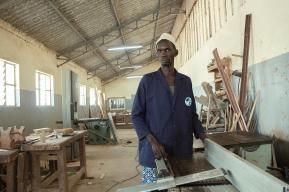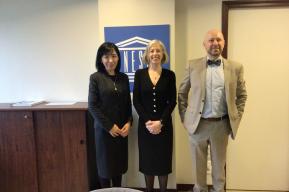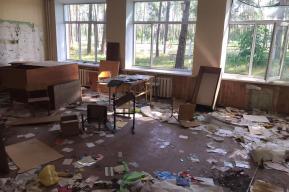
UNESCO-Nordic Partnership:
Over a decade of impact at a glance
Nordic Countries are Prime Partners of UNESCO
With a shared vision and priorities, UNESCO and the 5 Nordic countries (Denmark, Finland, Iceland, Norway, and Sweden) have worked in partnership to transform the lives of millions of people by promoting human rights through quality education, diversity of cultural expressions, freedom of expression, and ocean science. The UNESCO/Nordic Annual Review offers an opportunity to take stock of results achieved and discuss future opportunities in a spirit of trust and transparency.
Between 13 and 17 May 2024, UNESCO and the five Nordic countries will hold a UNESCO/Nordic Annual Review, covering all programmes areas of UNESCO. Nordic countries are prime partners of UNESCO - in 2023, voluntary contributions received from the 5 Nordic countries amounted to 25% of all voluntary contributions from governments to UNESCO. (see the infographic)
Nordic support is based on a long-term and strategic partnership, operationalized through flexible and multi-annual funding. We work jointly on medium/long-term programmes, thereby achieving greater impacts and results. Flexible funding provided by Nordic countries, in particular Norway and Sweden, allows UNESCO to respond to emerging priorities. For example, UNESCO’s response since the outbreak of the war in Ukraine has been possible thanks to such flexible funding mechanisms.

Transforming Education for all
Quality education for all holds paramount importance in our partnership, with Sweden and Norway providing steadfast support to UNESCO's mandate and work in the field of education, including education for health and wellbeing. In 2023, UNESCO capitalized on the strong political commitment established at the Transforming Education Summit.
On digital learning, UNESCO is leading the debate on the integration of technology, including emerging generative AI tools, in education and research through policy recommendations and innovative financing models.
On climate change education, UNESCO created a historic focus on education as the long-term solution to the climate crisis, working through the Greening Education Partnership, which now brings together 86 countries and over 1,200 organizations.
The support from Finland and Iceland enables capacity development of countries to develop their education systems, especially in Least Developed Countries.
Key achievements 2022-2023

supported to transform their education systems in 2022-2023

reached with life skills-based HIV & sexuality education

benefitted from TVET & literacy programmes

trained
Fostering freedom of expression
Freedom of expression, media freedom, and the safety of journalists is another key priority of the partnership with Nordic countries.
The Multi-Donor Programme directly supported actions in 29 countries in 2023, playing a pivotal role in upholding freedom of expression, journalist safety, and media development in emergencies.
The International Programme for the Development of Communication (IPDC), targeted to grassroots and local actors, have supported 35 grassroots projects and 8 special allocation initiatives implemented in 2022-2023.

trained over the past decade

trained over the past decade

at the “Internet for Trust” conference in 2022 for the regulation of digital platforms
Defending Artistic Freedom and the Diversity of Cultural Expressions
We have reached important milestones in making synergies between journalists and artists to promote freedom of expression, both of whom face the same threats to their safety and livelihoods in emergencies. Sweden and Norway have been at the forefront of this initiative. A recent study published in May 2023 outlines key recommendations on the way forward.

Ocean
In a spirit of co-creation, Norway and Sweden are also majors supporters for ocean science for sustainable development, in addition to Denmark through the hosting of IOC/UNESCO Science and Communication Centre on Harmful Algae for almost three Decades. Nordic funding has been essential to develop capacities and build engagement of African stakeholders and Early Career Ocean Professionals; organize a series of regional forums bringing together over 500 experts from 70 countries to collaborate on marine spatial planning; widen the number of communities across Pacific Island Countries and Territories that are recognized as or on the way to becoming “Tsunami Ready”; and become the leading agency, globally, in standard setting and implementation of ocean literacy projects.

More on UNESCO - Nordic Partnership
UNESCO-Nordic Annual Joint Review
The UNESCO-Nordic Annual Joint Review strengthens the strategic nature of the partnership and promotes long-term cooperation by institutionalizing regular dialogues and fostering trust and transparency. It has also been a forum through which the Nordic countries learn from each other, regarding the wide breadth and depth of the work of UNESCO and partnership modalities. UNESCO encourages its donors to engage with the Organization through annual reviews, an important accountability measure, which offers an opportunity to hold strategic dialogue, joint review of on-going cooperation and planning for the future.
In 2023, Norway and Sweden were among the top 3 governmental donors in terms of resource mobilization.

Programmes funded by Nordic countries









For free, independent and pluralistic media

For the growth of free and pluralistic press












